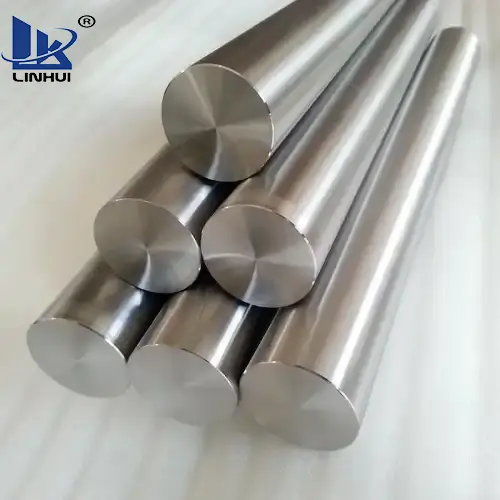Grade 19 Titanium Alloy Bar
SAE AMS 4957 – Bar and Wire
SAE AMS 4958 – Bar and Rod
ASTM B 348 Grade 19 – Bar and Billet
Description of Grade 19 Titanium Alloy Bar
Grade 19 (Ti-3Al-8V-6Cr-4Zr-4Mo) Alloy (UNS R58153) is a type of beta titanium Alloy (UNS R58640) This grade is a metastable
beta titanium alloy known for its exceptional ductility in the solution-treated (annealed) condition, and for its high strength and
ductility in the solution treated and aged condition (STA) condition. Improved tensile properties can be achieved while maintaining
good ductility and a low modulus of elasticity. Fatigue strength is also good in the STA condition.
This alloy is produced by one of two basic primary melting methods: vacuum arc (VAR) or plasma arc cold-hearth melting (PAM).
Primary melting is followed by vacuum arc remelting. Typical product forms are forged billet, rolled bar, rolled and/ or drawn rod, and
wire. These products find applications in high-strength aerospace and commercial applications, structural parts, gas and petroleum
down-hole piping systems and tooling, and high-strength coil springs and fasteners. Grade 19 Titanium alloy can be used for extended
periods in elevated temperature environments below 660°F (349°C).
SPECIFICATIONS & CERTIFICATES
SAE AMS 4957 – Bar and Wire
SAE AMS 4958 – Bar and Rod
ASTM B 348 Grade 19 – Bar and Billet
Chemical Composition
The chemical composition of grade 19 Ti 3Al 8V 6Cr 4Zr 4Mo alloy is outlined in the following table.
| Element | Content (%) |
|---|---|
| Titanium, Ti | 75 |
| Vanadium, V | 8 |
| Chromium, Cr | 6 |
| Zirconium, Zr | 4 |
| Molybdenum, Mo | 4 |
| Aluminum, Al | 3 |
| Iron, Fe | ≤ 0.30 |
| Oxygen, O | ≤ 0.14 |
| Carbon, C | ≤ 0.050 |
| Nitrogen, N | ≤ 0.030 |
PHYSICAL PROPERTIES
Melting Range: 2,830°F – 3,000°F (1,554 – 1,649°C)
Density: 0.174 lbs/in3
(4.82 gm/cm3)
Specific Heat @ 70°F (21°C), 0.123 Btu/lb °F (515 J/kg °K)
Beta Transus Temperature: typically 1,350°F +/-25°F (732°C +/-14°C)
Elastic Modulus: As-rolled / solution h.t.: 13 – 14 Mpsi
Solution treated + aged: 14 – 16 Mpsi.
HEAT TREATMENT
For high-strength applications, heat treating usually consists of solution annealing followed by aging during final product
manufacturing. Cold drawing prior to aging will increase strength, while good ductility is still retained. Solution annealing should be
performed at least 50°F (28°C) above the transus temperature, preferably in the range of 1,450 – 1,700°F (788- 927°C), and the product
may be air cooled or water quenched. Aging is achieved at temperatures of 850 – 1,000°F (454 – 538°C) for 4 to 24 hours with air
cooling. Specific aging time and temperature may be varied to achieve the desired strength level.
HARDNESS
Typical hardness in the solution annealed condition can range from 250-300 HB. In the STA condition, hardness ranges can be
350-440 HB.
FORESEEABILITY
Cold formability is very good, and ductility levels of 60-70% RA for a 30% cold-drawn product are possible after solution annealing.
FORMABILITY
Grade 19 Titanium alloy bar has good fabricability when forming in hot or warm conditions in the preheated range of 1,500-1,900°F (816-
1,038°C).
MACHINEABILITY
In general, titanium alloys have machinability ranging from annealed austenitic stainless steels to 1/4-hard and 1/2-hard stainless
steels. Grade 19 Titanium alloy machines similarly to Ti-13V-11Cr-3Al and other beta titanium alloys in the solution treated and aged
condition. Chlorine-containing coolant fluids are generally not recommended.
WELDABILITY
Grade 19 Titanium alloy is weldable in the solution-annealed condition. However, care should be taken to weld in an inert environment (or
ensure adequate inert gas shrouding takes place during welding) to avoid excessive nitrogen or oxygen pick-up. Welds may be
somewhat strengthened by aging, with some ductility loss. Welding should not be performed following solution + age heat
treatments.
| Packing & Shipping |
1. Accept the request/customized packing | |
2. Normally, goods will packed by poly bag, drawstring bag, carrying bag and cartons | |
3. For the sample, we will use TNT, Fedex, UPS, DHL, etc to ship it, | |
4. For bulk, it depends on the qty, by air, by train or by sea are all available. |







